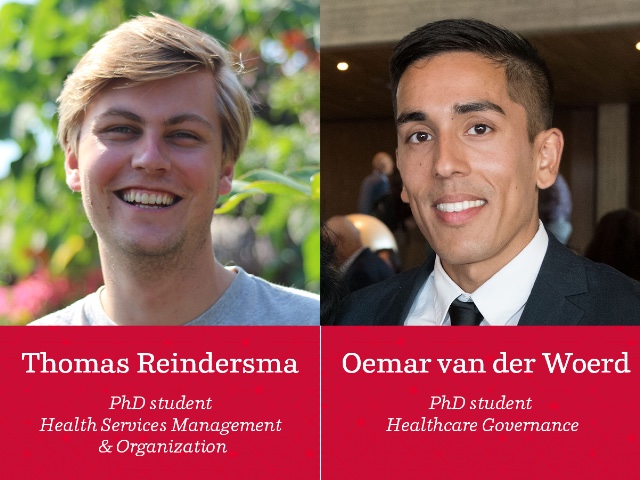Blog Aletta's Talent Network: Exploring career paths in academia
| Datum: | 28 mei 2021 |

Thomas Reindersma (PhD candidate Health Services Management & Organization, reindersma@eshpm.eur.nl) and Oemar van der Woerd (PhD candidate Healthcare Governance, vanderwoerd@eshpm.eur.nl), Erasmus University Rotterdam
As bloggers before us have pointed out, doing a PhD during the COVID-19 pandemic is quite a heavy task. Even under ‘normal’ circumstances, it is quite a solitary – and from time to time lonely – affair, let alone in pandemic times. However, do not despair because this short note will not be focused on the humdrum of doing a PhD in uncertain times. Rather, we would like to give some oxygen to your optimism. yESHPM, the Rotterdam counterpart to ATN frequently organizes inspiration talks for early-career researchers. We are happy to seize the opportunity to reflect on some of the lessons learned so far throughout the talks of Professors Pauline Meurs, Kim Putters, Rianne Letschert, Jochen Mierau.
At times, and certainly in the beginning, it might seem that doing a PhD feels like running a one-man business. However, it is important to not forget that you have to relate to a variety of interrelated stakeholders: the supervisory team; peers in- and outside the department or organization; society at large; and often less mentioned: students. Living up to various and diverging expectations of these stakeholders is difficult. Yet at the same time, valuing these expectations helps to avoid forms of ‘tunnel vision’, preventing young scholars to be drifted away from their research interests.
In the view of Professor Letschert, besides accelerating as an individual, being a ‘team player’ should be encouraged in academia. All speakers to some extent encourage ‘networking with purpose’: unfolding meaningful extracurricular activities that relate to personal research interests. Yet, it is advised to not make them a goal on their own. Don’t be fooled by fellow peers who do more on the side, because more does not always have to be better. Developing and monitoring your line of research is the bottom line.
“Do not stay at the university”, was the key advice offered by Professor Meurs during her talk. “It will make you narrow minded.” You are free to interpret this in two ways. If you want to have impact you have to strike a balance between your work at the university and your contribution to society: “be out there”. But it can also be interpreted as an encouragement to pursue a career outside academics. The idea that leaving the ‘academic church’ after completing your PhD is a failure is really outdated, according to Jochen Mierau. Remember that your PhD is just a starting point, although it might sometimes seem to be(come) your magnum opus. You shouldn’t specialize too quickly.
Professor Putters, a ‘hybrid’ person who maneuvers between science, policy and politics, reminded that doing a PhD is a privileged, almost elite job. It offers many opportunities for personal development, yet at the same time carries the risk of drowning. Gaining a lot of valuable knowledge also comes with responsibilities. “Don’t question if you have a story to tell or whether you could inspire others”, was his key advice. Presenting thought-provoking findings to a wider audience – including students – and collecting their reflections could help to position yourself in societal and theoretical debates more precisely.
Overall, the talks reflected that governing a PhD trajectory is full of opportunities and struggles at the same time. It requires work on several layers with different stakeholders with diverging expectations. What stood out for career development is that coincidence and luck are important ingredients for a ‘successful’ career, but determination is what eventually pulls you through, dixit Professor Mierau. In essence, whatever a successful career is might be yours to decide.
All four recaps of the inspirational talks can be read on the website of ESHPM.



